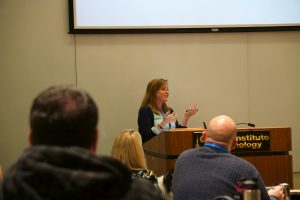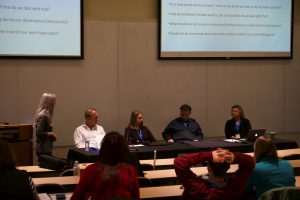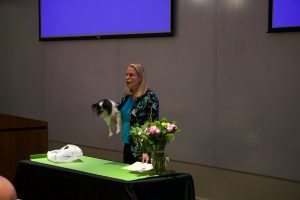CPT founder and Dog Star Technologies co-founder Mark Spivak was a featured panelist at the 5thAnnual International Animal-Computer Interaction Conference, entitled “ACI 2018.” The Conference, held on the campus of Georgia Tech University, included speakers and participants from the USA, Australia, England, Finland, France, Germany, Israel, Italy, Japan, Russia, Spain, and Sweden.
Workshops and presentations covered a diverse range of subjects relevant to animal-computer interaction. Subjects included:
• participatory design methodologies,
• acoustic designs related to animal-computer interaction studies and the effect of acoustics on different species,

• dolphin and computer interfaces and communication studies,
• tail wagging as a measure of canine emotional state,
• methodologies for canine participant selection,
• gait analysis in equine sports,
• classifying dog activity via GPS movement sensors,
• designing digital enrichment for orangutans,
• modularity, tangibility, play engagement, and cognitive enrichment in gorilla studies,
• computer tasks for great apes promote functional naturalism in a zoo setting,
• designing robotic horse ears to replicate individuality in canine animatronics,
• using GPS dog activity monitors to determine dog happiness,
• the utility of cat GPS data,
• dry contact electrode performance in canine ECG measurement,
• training dogs to use touchscreens,
• a case study for using assistance dogs to operate emergency notification systems,
• animal-computer interfaces,
• qualitative assessments of animal shelters,
• using position tracking to infer social structure in rhesus macaques,
• understanding animal vision,
• computer and wearable technology to improve the performance of working and assistance dogs, and
• decoding animal language using computers and artificial intelligence.

The bioethics panel headlined the third day of the Conference. The formal title of the session was “Ethics and Welfare in Animal-Computer Interaction.” The panel consisted of:
• Dr. Denise Herzing , Director of the Wild Dolphin Project and a leader in using technology to decipher dolphin communications.Dr. Herzing’s findings have been influential in learning about the relationship between communication and dolphin behavior and social structure;
• Dr. Con Slobodchikoff, creator of the Animal Language Institute and author of “Chasing Dr. Doolittle: Learning the Language of Animals.” Dr. Slobodchikoff is the first person to use technology to interpret the communication system of prairie dogs, whereby he discovered linguistic processes that previously were believed exclusive to humans,. His groundbreaking findings challenged existing animal communication theories;
• Lynn Yakubinis, the Lead Keeper of the Primate Department at Zoo Atlanta. Lynn is known for her research using technology and computer games to enrich the zoological experience of orangutans. She also studies the behavior of orangutans in an effort to preserve them and improve both their captive and wild quality of life, despite a depleting habitat that endangers their existence; and
• Mark Spivak, CEO and Head Trainer of Comprehensive Pet Therapy, Inc. and Chief Operating Officer of Dog Star Technologies, LLC. Mark is a training innovator who became the first person to train any non-human animal to remain motionless in an MRI without the use of sedation or restraints. The research Mark has conducted in collaboration with Dr. Gregory Berns of Emory University and Dog Star Technologies has been featured on “60 Minutes” and “Nova” and advanced the use of MRI/fMRI for humane, noninvasive canine studies.
The panel was moderated by Dr. Clara Mancini from The Open University, the largest undergraduate university in the UK. Dr. Mancini is the founder of the Animal-Computer Interaction Conference and the creator of methods for cancer detection dogs to communicate using technology.
The panel’s objective was to discuss key bioethics questions, including:
• Do we need consent when researching animals?
• How do we know we have consent?
• Is it possible for animals to opt out?
• How do we ensure animal well-being?

The panelists each provided unique perspectives based on the animal species they study (dogs, dolphins, orangutans, and prairie dogs) and the technology they use (MRI/fMRI, computers, video/audio artificial intelligence interfaces, and touchscreens). All the panelists had a personal goal of maximizing scientific understanding of animal behavior and communication while concurrently considering the immediate welfare of the research subject, the long-term welfare of the relevant species, and the potential impact of research in improving the quality of human life. The panelist presentations, discussions, and audience interaction were engaging, thought provoking, and entertaining for both the panelists and conference attendees.
Mark wishes to thank Dr. Melody Moore Jackson of the Georgia Tech University Animal-Computer Interaction Laboratory for the invitation to the panel. Dr. Jackson and her colleague, the brilliant, soon to be Dr. Ceara Byrne, have created novel interactive and wearable technology for improving the communication between service dogs and their disabled handlers.
(Dog training Atlanta)